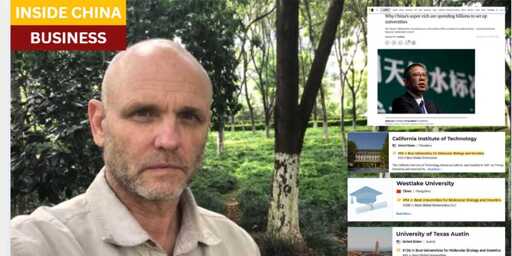Thanks for reading Inside China / Business! Subscribe for free to receive new posts and support my work.
Bullets:
Some of China’s wealthiest industrialists are spending billions to establish private universities, with the goal of building world-class institutes for research and applied sciences.
Their stated objectives are bold: to directly challenge the top universities globally, attract hundreds of top scientists, and hundreds of thousands of the brightest students. In doing so, they will become global benchmarks for excellence at the highest level.
At first glance it seems unlikely that a new university could soon place among top universities worldwide.
But two other privately-funded Chinese universities already are. Geely Automotive Group established a university to train engineers; the company is now the world’s 10th largest.
And Westlake University in Hangzhou was founded a mere seven years ago, by top scientists in biology. In key fields, Westlake today is already ahead of global top 100 schools like Texas, University of Sydney, and University of North Carolina.
Report:
Good morning. There is a wave in China of wealthy entrepreneurs setting up private universities, especially in high-tech and applied research.
Zhong Shanshan is one of the richest people in China, and his company is the number one seller of bottled water here, and China is the world’s biggest market for bottled water. Mr. Zhong is spending over $5 billion to build a new private university, and he has ambitious goals for quality, and for growth: 15 top-tier experts a year, 500 leading scientists, and 350,000 students.
The chairman of Will Semiconductor has pledged over $4 billion to build the Eastern Institute of Technology, in Ningbo, specializing in applied technology.
Cao Dewang is head of Fuyao, which is a huge manufacturer of automotive glass. He is setting up Fuyao University of Science and Technology. The objective at FYUST is to compete against Stanford; to be in the top tier for materials science, AI, and mechanical engineering.
There’s nothing much unusual about this so far. Wealthy people eventually run out of houses and boats to buy, and look for buildings to put their names on the side of—art galleries, libraries, hospitals for the rich, and a university in the case of the super rich.
There are other institutions here set up by billionaires, Geely University in Beijing and Westlake University. Geely is a car company, and their university trains automotive engineers, primarily. Geely is now the 10th largest carmaker in the world, and they own other world-class brands, including Volvo and Lotus. Geely University probably doesn’t have trouble attracting students if it means they can graduate to work at the company.
The other university mentioned is Westlake University. They “paved the way for the trend” we’re seeing today. Westlake was established in Hangzhou in 2018, in October, with the same objective—to become one of the world’s top research institutes.
Shi Yigong is a top expert in Molecular Biology, and he and six other scholars got together to set up a university. There’s nothing unusual about that either—researchers and professors like to sit around and imagine how much better everything would be if they were in charge of running things. So they called up some of their rich friends in business, some Chinese friends living overseas, and office workers—and they built their own.
But here is what is surprising: It’s already one of the best in the world. In Molecular Biology, it’s ranked #94, just after CalTech. Westlake is ahead of Lund University. They’re over 30 spots ahead of University of Texas. Westlake University is only 7 years old. The US News and World Report doesn’t even have a photo of it yet. In Chemistry, Westlake ranks ahead of the University of Sydney, and the University of North Carolina.
China is where research is applied, in manufacturing and in industry. Chinese public universities are dominating the rankings across STEM fields, and in everything else that has real-world applications in mining, or in agriculture, or in manufacturing. The idea here for these private universities is to build them next door to the companies doing the work, give them some seed money and some time, and just step back and watch. The bottled water billionaire or the guy who makes 180 million windshields a year probably aren’t going to be teaching classes themselves, unlike the people who run Westlake and Geely. But if history repeats, Stanford is going to have a problem.
Be Good.
Resources and links:
Geely, Group at a glance
https://zgh.com/overview/?lang=en
Guangming Daily interprets Westlake University from four perspectives: Hello, Westlake University
https://en.westlake.edu.cn/news/_events/westlakenews/inthemedia/_3402/201912/t20191221/_34411.html
Westlake University established in Hangzhou
https://news.cgtn.com/news/3d3d774d3445444d30457a6333566d54/index.html
South China Morning Post, Why China’s super-rich are spending billions to set up universities
China’s Billionaires Are Building Universities to Drive Innovation and Stay Politically Favorable
Beijing Geely University
https://english.beijing.gov.cn/studyinginbeijing/choices/202009/t20200918_2066934.html
China’s Richest Person Made Billions Bottling Pristine Water
https://en.westlake.edu.cn/faculty/yigong-shi.html
Thanks for reading Inside China / Business! Subscribe for free to receive new posts and support my work.
From Inside China / Business via this RSS feed


